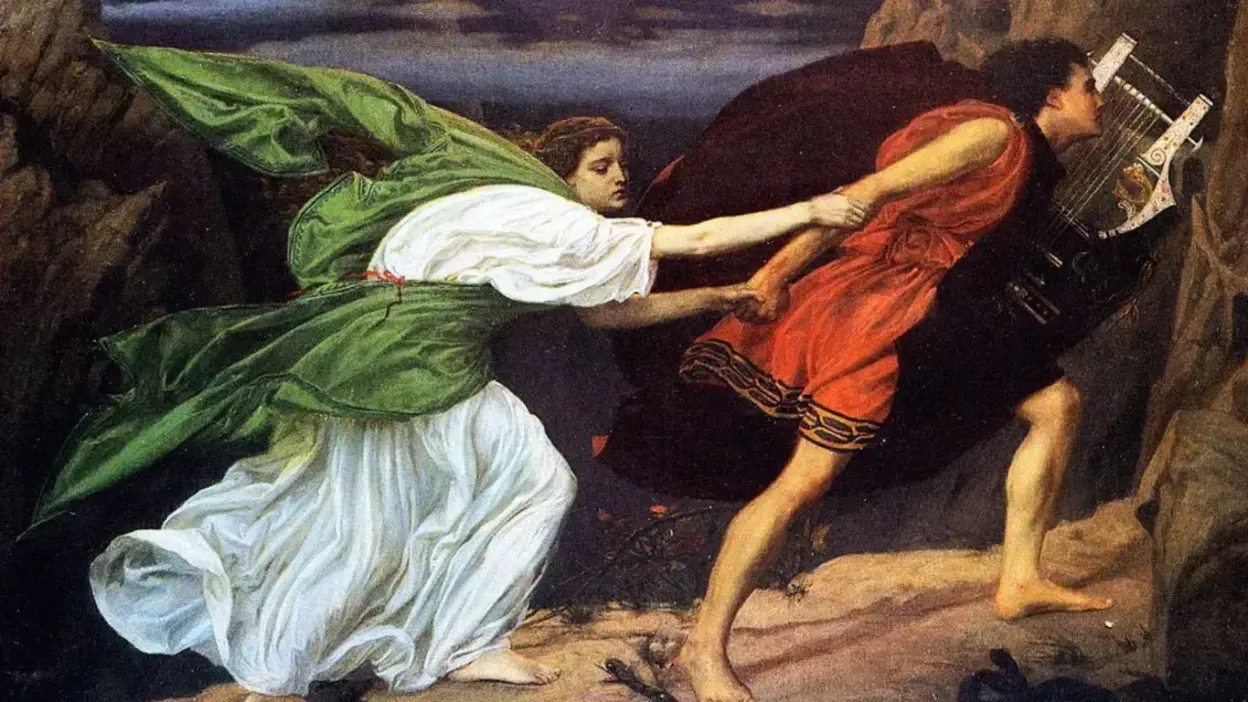In the annals of ancient Greek mythology, few tales have captured the hearts of people throughout the ages like the story of Orpheus and Eurydice. This fateful love story, set in the enchanting realms of the Underworld, weaves a timeless narrative of love, loss, and the power of music. In this blog, we delve into the captivating myth of Orpheus and Eurydice, exploring its various versions and enduring impact on literature, art, and culture.
The Myth of Orpheus and Eurydice
The legend of Orpheus and Eurydice begins with the gifted musician Orpheus, son of Apollo and the muse Calliope. As a master of the lyre, Orpheus possessed an enchanting musical prowess that could move both gods and mortal beings alike. He fell deeply in love with the beautiful and graceful Eurydice, and their union seemed destined for perfection.
Tragedy struck shortly after their marriage when Eurydice met a sudden and untimely death. Various versions of the myth narrate different circumstances surrounding her passing, but one common thread remains: Orpheus’ grief knew no bounds, and he sought to bring her back from the clutches of death.
The Descent into the Underworld
Driven by an unwavering love for his departed wife, Orpheus embarked on an extraordinary journey to the Underworld, guided by the haunting melodies of his lyre. Defying mortal limitations, he traversed the Stygian realm, evoking emotions from ghosts and souls alike.
The Underworld, shrouded in darkness and Mystery, seemed to hold its breath as Orpheus’ ethereal music pierced through the somber veil, resonating with the souls of the departed, granting them a momentary respite from eternal lamentation.
The Fateful Deal with Hades and Persephone
In the realm of Hades, Orpheus faced the imposing god of the Underworld, Hades, and his compassionate wife, Persephone. Moved by the sheer power of Orpheus’ music, Hades agreed to allow Eurydice to return to the world of the living on one condition: Orpheus must lead her out of the Underworld without looking back until they reached the surface.
The tense moment of the fateful deal, Persephone, with empathetic eyes, added a glimmer of hope, saying, “Orpheus, your love for Eurydice is strong, and your music has touched our hearts. Show unwavering faith, and she shall be restored to your arms.”
Love Lost: A Heartbreaking Turn of Events
With hope in his heart, Orpheus led Eurydice through the shadowy depths of the Underworld. The weight of uncertainty and the inability to hear her footsteps began to gnaw at him. Finally, unable to contain his doubt, he turned to look at his beloved, violating the sacred condition.
In that moment, the tragedy unfolded, and Eurydice was lost to him forever, relegated once more to the realm of Hades. Orpheus’ heartbreak knew no bounds, and his attempts to return to the Underworld were in vain.
The Legacy of Orpheus and Eurydice
The tale of Orpheus and Eurydice has left an indelible mark on human consciousness. It continues to be retold in various forms of art, literature, and performance, from ancient times to the present day. Virgil’s Georgics and Ovid’s Metamorphoses are notable classical works that have immortalized this poignant love story.
The legacy of Orpheus and Eurydice reaches beyond the realms of literature and art, influencing philosophical discourse and inspiring reflections on the nature of love, loss, and the human condition. Philosophers and thinkers have drawn parallels from this ancient myth, exploring themes of resilience, the transient nature of life, and the profound impact of our choices on our destinies.
As we continue to unearth new interpretations and delve into the depths of this timeless tale, Orpheus and Eurydice remain eternal symbols of the unyielding power of love and the enduring allure of the Underworld’s mysteries.
Symbolism and Themes
Beyond its captivating narrative, the myth carries profound symbolism and themes that resonate with the human experience. Love’s power to inspire bravery and determination, the inevitability of loss, and the consequences of doubt are all central elements explored in the tale.
The journey to the Underworld symbolizes the human quest for redemption and the willingness to confront darkness for the sake of love and hope. The lyre, a divine gift from Apollo, embodies the transformative power of art and music in expressing emotions and seeking solace during times of grief. Moreover, Orpheus’ inability to resist looking back at Eurydice signifies the frailty of human resolve and the vulnerability that accompanies intense emotions. Ultimately, the myth of Orpheus and Eurydice serves as a timeless reminder of the complexities of love and the profound impact it has on the human spirit.
Lessons Learned
The tragic fate of Orpheus and Eurydice serves as a cautionary tale, urging us to cherish love and to trust even in the face of uncertainty. It reminds us of the fragility of life and the consequences of acting impulsively or losing faith.
Lessons Learned –
- Cherish love and appreciate its beauty.
- Trust in love and have faith even during challenging times.
- Caution against impulsive actions driven by emotions.
- Embrace the fragility of life and the impermanence of existence.
- The consequences of doubt and the importance of unwavering belief.
- The transformative power of art and music in expressing emotions.
- The human quest for redemption and the willingness to confront darkness for love and hope.
Also Read: Demeter | Greek Goddess of The Harvest and Agriculture | Story




